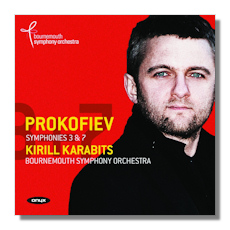
The Internet's Premier Classical Music Source
Related Links
- Prokofieff Reviews
- Latest Reviews
- More Reviews
-
By Composer
-
Collections
DVD & Blu-ray
Books
Concert Reviews
Articles/Interviews
Software
Audio
Search Amazon
Recommended Links
Site News
 CD Review
CD Review
Serge Prokofieff

Symphonies, Volume 1
- Symphony #3 in C minor, Op. 44
- Symphony #7 in C Sharp minor, Op. 131
Bournemouth Symphony Orchestra/Kirill Karabits
Onyx 4137 65m
This is the first issue in Karabits' Prokofiev symphony cycle on the Onyx label. From the evidence here, I would say Karabits seems to be a conductor who not only fully understands Prokofiev but knows how to extract precisely the performance he wants from the orchestra. And that orchestra is a fine one: in both symphonies Karabits draws excellent performances from the splendid Bournemouth Symphony Orchestra, an ensemble he has served as Principal Conductor since 2009. Ironically, the orchestra's previous Principal Conductor and now Conductor Emeritus, Marin Alsop, is also in the midst of her own Prokofiev symphony cycle for Naxos, with the São Paulo Symphony Orchestra.
Perhaps Karabits' greatest strength is how he handles harmonies: he deftly blends them into the sonic fabric without ever allowing them to intrude on the main line. You seem to hear everything, all of Prokofiev's very full and busy orchestration, but in the proper proportions. Rhythms too are given their due as they generally emerge with crispness and never come on like percussive thumping, as they often do in other conductors' Prokofiev performances. Karabits uses little rubato and is generally straightforward, letting the music flow naturally. His tempo choices, which fall into the moderate to slightly brisk range, make the music sound spirited and vital, never ponderous or lumbering.
Prokofiev's Third Symphony is based on music from his opera The Fiery Angel, an imaginative and masterful work that was not performed in the composer's lifetime. (Coincidentally, my review of the Gergiev/Maryinsky Arthaus Musik DVD 100391 of the opera is also available.) The otherworldly nature of the Third Symphony emerges with power and vivid colors in Karabits' interpretation, allowing those familiar with the opera to easily picture scenes from it, especially the more grisly moments from Act 5, which are portrayed in the symphony's finale. While most new listeners will likely view this work strictly as a symphony (structurally, it very much fits the form), once they see the opera they'll find it difficult to separate the symphony from it, especially when listening to so vital and colorful a performance as this one by Karabits.
The Seventh Symphony is equally excellent. Some critics have disparaged the work, asserting it is ballet music in symphonic disguise. Well, if that's true, I must say the ballet music is quite excellent and conceals its true nature very well. The symphony was initially intended for young audiences, but as work on it progressed the music developed a wistful or even tragic sense. Yet, its expressive language remained relatively uncomplicated. In this performance, Karabits doesn't downplay the straightforward character of the music or the unabashedly Romantic nature of the themes in the first and third movements. Rather, he reinforces those elements with well detailed phrasing that flows seamlessly along to allow the seeming innocence of the music's character to divulge that sadder more subtle side. He chooses the slow ending to the finale, although a separate track contains the brief alternate ending.
If things go as well in succeeding volumes of Karabits' cycle, I would say his set could well rank with the finest previous complete Prokofiev symphony cycles, those by Kitayenko (Phoenix Edition 135), Gergiev (Philips 4757657), Järvi (Chandos CHAN10500), Kuchar, Weller, and perhaps Rozhdestvensky, if you don't mind the somewhat dated Soviet-era sonics. The sound reproduction on this new Onyx CD is very detailed and clear. The Onyx album booklet contains a brief introduction by Karabits and an interview with him by Daniel Jaffe, a noted Prokofiev biographer. Karabits and the Bournemouth players have delivered a most desirable disc here. Highly recommended!
Copyright © 2014, Robert Cummings





















